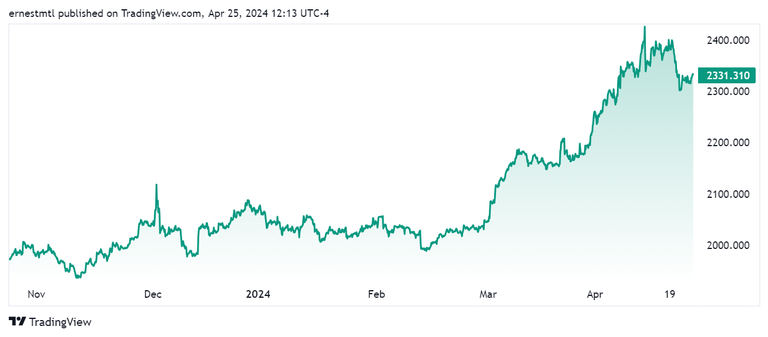(Kitco News) – Even as spot gold trades $100 lower than the all-time high set on April 12, the supply, demand and price distortions continue to impact local gold markets around the world.
In Turkey, the recent missile and drone attacks by Israel and Iran sparked rumors that gold prices would shoot higher, which drove the already overheated gold market into overdrive, according to a report from Xinhua.
“In Türkiye, it’s a cherished tradition to bestow gold upon newlyweds, and with the summer wedding season fast approaching, our demand for this precious metal is soaring,” Turkish citizen Faruk Mutlu told the news agency. Mutlu said he was in Istanbul’s gold market to convert all of his savings to bullion, which unlike the country’s beleaguered lira, he considers “always valuable.”
Istanbul’s jewelry industry hub is seeing lengthy queues at gold stores as citizens who were already clamoring for gold at unprecedented prices as a safe haven from skyrocketing inflation now worry that an escalation in the conflict could drive prices higher still.
Riza Gokay Tugsavrol, owner of the Harem Gold jewelry store, told Xinhua that instead of discouraging buyers, the recent high gold prices make the precious metal only more attractive. “In times of chaos and geopolitical upheavals such as war, investors often see gold as a secure refuge, relying on it as a stable asset,” he said.
Tugsavrol underlined just how dramatic the price appreciation has been in the country. “Before the conflict, one gram of gold was hovering around the 2,500-Turkish-lira [$76.75] mark,” he said. “After the escalation, it surged to 2,630 liras and even began testing the 2,650 [$81.51] levels.”
Local gold prices have shot up by one third in just a few months. One gram of gold in Turkey costs around 2,000 liras, or $61.51, at the start of the year.
Murat Tufan, an economic analyst with the Ekoturk broadcaster, said the runaway demand and rising prices are being driven by heightened geopolitical risks.
“The fear index has started to exert its influence, especially after Iran’s retaliatory measures against Israel,” Tufan said. “This uptick suggests that investors are growing increasingly uneasy in financial markets, with concerns that the conflict between Israel and Iran could potentially escalate further.”
The head of the Turkish State Mint, Abdullah Yasir Sahin, also cautioned citizens and shop owners about the prevalence of counterfeit gold coming from small workshops.
In Vietnam, conversely, the central bank is having a hard time unloading gold. Even though demand is high, it seems the bank’s prices are higher still.
On Thursday, the State Bank of Vietnam was forced to cancel its second gold bar auction this week after only one business registered to participate in the auction. The central bank invited businesses to join three auctions this week, but two of them have been canceled due to low participation.
Even in Tuesday’s successful auction, only two out of 11 participants made bids, and only 20% of the 16,800 taels the central bank offered were sold. A tael equals 37.5 grams, or 1.2 ounces.
A former director of a large Vietnamese gold distributor, who asked not to be identified, told VnExpress that gold demand has stabilized following a recent surge, and the central bank’s high starting prices are discouraging businesses from making bids.
The last time the central bank sold gold bars was in 2013 when it managed to unload over 1.8 million taels in a series of 76 auctions.
Spot gold last traded at $2,331.31, up 0.66% on the session at the time of writing.
Disclaimer: The views expressed in this article are those of the author and may not reflect those of Kitco Metals Inc. The author has made every effort to ensure accuracy of information provided; however, neither Kitco Metals Inc. nor the author can guarantee such accuracy. This article is strictly for informational purposes only. It is not a solicitation to make any exchange in commodities, securities or other financial instruments. Kitco Metals Inc. and the author of this article do not accept culpability for losses and/ or damages arising from the use of this publication.
Credit: Source link
